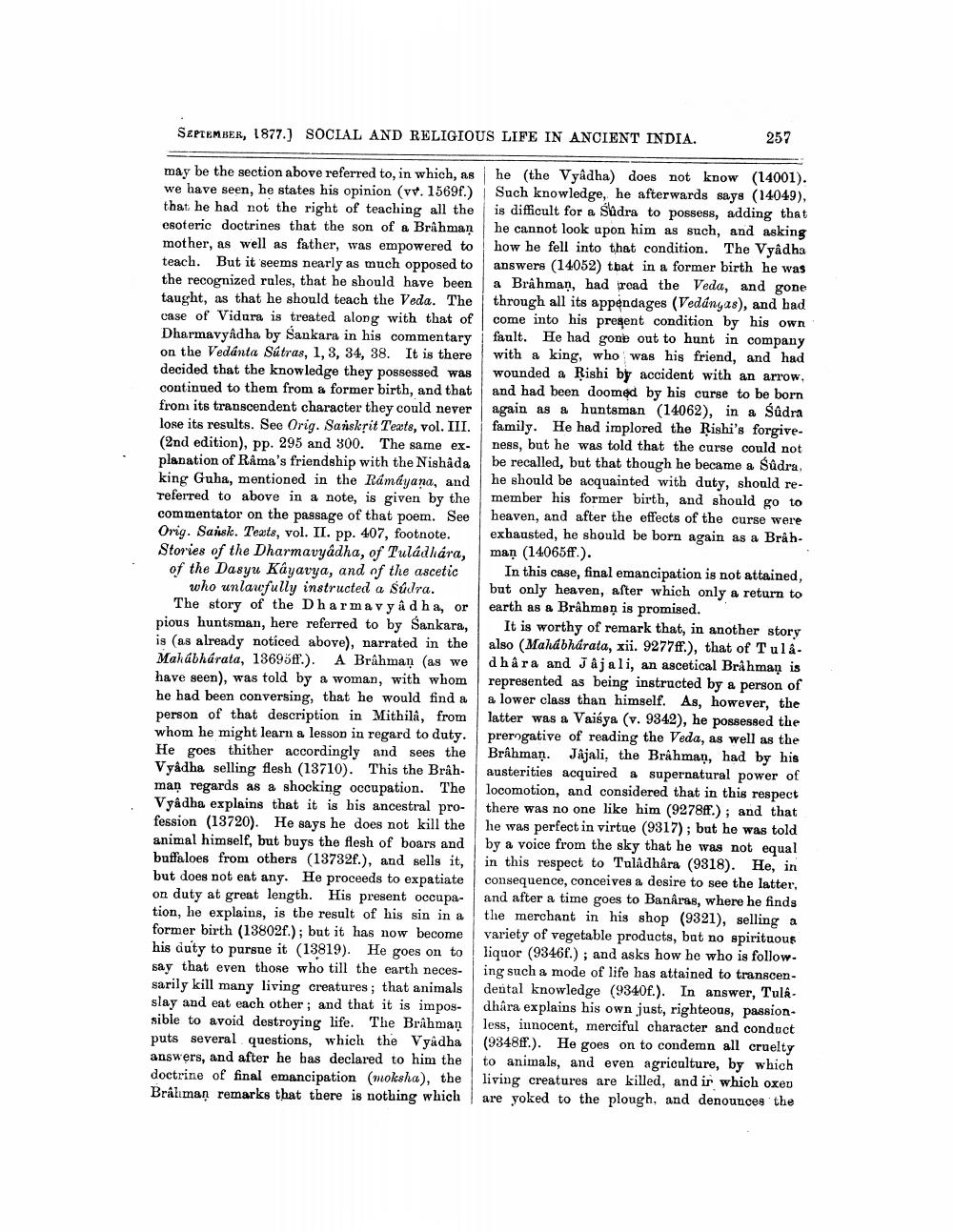________________
SEPTEMBER, 1877.) SOCIAL AND RELIGIOUS LIFE IN ANCIENT INDIA.
257
may be the section above referred to, in which, as he (the Vyâdha) does not know (14001). we have seen, he states his opinion (vv. 1569.) | Such knowledge, he afterwards says (14049), that he had not the right of teaching all the is difficult for a Sudra to possess, adding that esoteric doctrines that the son of a Brůhman he cannot look upon him as such, and asking mother, as well as father, was empowered to how he fell into that condition. The Vyâdha teach. But it seems nearly as much opposed to answers (14052) that in a former birth he was the recognized rules, that he should have been a Brâhman, had read the Veda, and gone taught, as that he should teach the Veda. The through all its appendages (Vedángas), and had case of Vidura is treated along with that of come into his present condition by his own Dharmavyâdha by Sankara in his commentary fault. He had gone out to hunt in company on the Vedánta Sútras, 1, 3, 34, 38. It is there with a king, who was his friend, and had decided that the knowledge they possessed was wounded a Rishi by accident with an arrow, continued to them from a former birth, and that and had been doomed by his curse to be born from its transcendent character they could never again as a huntsman (14062), in a Sûdra lose its results. See Orig. Sanskrit Texts, vol. III. family. He had implored the Rishi's forgive(2nd edition), pp. 295 and 300. The same ex- ness, but he was told that the curse could not planation of Rama's friendship with the Nishada be recalled, but that though he became a Sudra, king Guha, mentioned in the Ramayana, and he should be acquainted with duty, should re. referred to above in a note, is given by the member his former birth, and should go to commentator on the passage of that poem. See heaven, and after the effects of the curse were Orig. Sansk. Teats, vol. II. pp. 407, footnote. exhausted, he should be born again as a Bråh. Stories of the Dharmavyâdha, of Tuladhara, man (14065ff.). of the Dasyu Kayavya, and of the ascetic In this case, final emancipation is not attained,
who unlawfully instructed a Súdra. but only heaven, after which only a return to The story of the Dharma vya dha, or earth as a Brâhman is promised. pious huntsman, here referred to by Sankara, It is worthy of remark that, in another story is (as already noticed above), narrated in the also (Mahábhárata, xü. 9277ff.), that of Tula. Mahábhárata, 13695ff.). A Brahman (as we dhåra and Jâjali, an ascetical Brahman is have seen), was told by a woman, with whom represented as being instructed by a person of he had been conversing, that he would find a a lower class than himself. As, however, the person of that description in Mithilâ, from latter was a Vaisya (v. 9342), he possessed the whom he might learn a lesson in regard to duty. prerogative of reading the Veda, as well as the He goes thither accordingly and sees the Brahman. Jâjali, the Brahman, had by his Vyâdha selling flesh (13710). This the Brah- austerities acquired a supernatural power of man regards as a shocking occupation. The locomotion, and considered that in this respect Vyâdha explains that it is his ancestral pro- there was no one like him (9278ff.); and that fession (13720). He says he does not kill the he was perfect in virtue (9317); but he was told animal himself, but buys the flesh of boars and by a voice from the sky that he was not equal buffaloes from others (13732f.), and sells it, in this respect to Talâdhára (9318). He, in but does not eat any. He proceeds to expatiate consequence, conceives a desire to see the latter, on duty at great length. His present occupa- and after a time goes to Banaras, where he finds tion, he explains, is the result of his sin in a the merchant in his shop (9321), selling a former birth (13802f.); but it has now become variety of vegetable products, but no spirituous his duty to pursue it (13819). He goes on to liquor (9346f.); and asks how he who is followsay that even those who till the earth neces- ing such a mode of life has attained to transcensarily kill many living creatures; that animals dental knowledge (9340f.). In answer, Tulaslay and eat each other; and that it is impos- dhâra explains his own just, righteous, passionsible to avoid destroying life. The Brahman less, innocent, merciful character and conduct puts several questions, which the Vyâdha (9348ff.). He goes on to condemn all cruelty answers, and after he has declared to him the to animals, and even agriculture, by which doctrine of final emancipation (moksha), the living creatures are killed, and ir which oxed Brálıman remarks that there is nothing which are yoked to the plough, and denounces the




